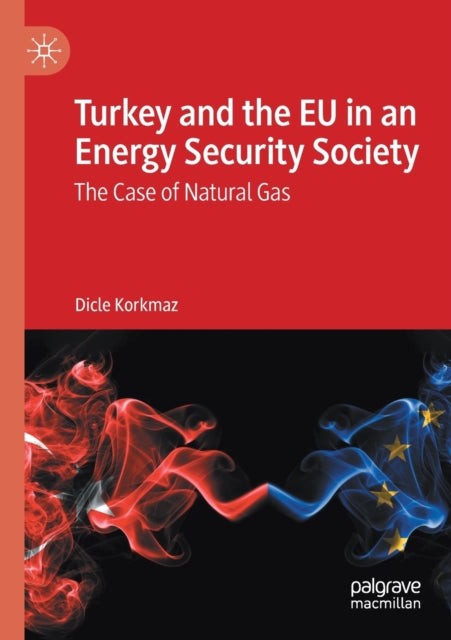Dicle Korkmaz
Turkey and the EU in an Energy Security Society: The Case of Natural Gas
Turkey and the EU in an Energy Security Society: The Case of Natural Gas
YOU SAVE £7.52
- Condition: Brand new
- UK Delivery times: Usually arrives within 2 - 3 working days
- UK Shipping: Fee starts at £2.39. Subject to product weight & dimension
Bulk ordering. Want 15 or more copies? Get a personalised quote and bigger discounts. Learn more about bulk orders.
Couldn't load pickup availability
- More about Turkey and the EU in an Energy Security Society: The Case of Natural Gas
This book examines Turkey-EU relations in the context of natural gas, using the English School theory and narrative policy analysis to explore EU narratives on Turkey's role in European energy security and Turkish actors' narratives on natural gas pipelines and market liberalization. It compares the narratives of the EU and Turkish actors to assess how references to the content and scope of integration varied between January 2001 and July 2019, focusing on energy security rather than full membership in the EU.
Format: Paperback / softback
Length: 260 pages
Publication date: 01 November 2021
Publisher: Springer Nature Switzerland AG
This comprehensive book delves into the intricate dynamics of Turkey-EU relations, particularly in the realm of natural gas. By employing the English School theory and narrative policy analysis, the author conducts a thorough examination of EU narratives regarding Turkey's role in European energy security within the context of natural gas. Additionally, the book explores the perspectives of Turkish actors on natural gas pipelines and the liberalization of the natural gas market. The central focus of the book is to assess the extent to which the positions held by Turkish actors on natural gas and energy security either hinder or facilitate their integration with the EU. To achieve this, the author compares the narratives of the EU and Turkish actors, spanning from January 2001 to July 2019. It is important to note that integration in this context does not necessarily entail Turkey's full membership in the EU. Instead, it encompasses a range of relations categorized as energy security societies.
The book begins by providing a historical background, tracing the evolution of Turkey-EU relations and the significant role that natural gas has played in shaping them. It highlights the geopolitical significance of Turkey as a transit country for natural gas, as well as the challenges and opportunities it presents for both the EU and Turkey.
Chapter 1 delves into the theoretical framework employed in the study. The English School theory, which emphasizes the role of narratives in shaping policy outcomes, is introduced, along with narrative policy analysis as a tool to analyze these narratives. The author explains how the theory can be applied to understand the complex dynamics of Turkey-EU relations, particularly in the context of natural gas.
Chapter 2 explores EU narratives on Turkeys role in European energy security in the sphere of natural gas. The author analyzes the various EU narratives regarding Turkey's potential contributions to European energy security, such as its role as a transit country, its potential as a supplier of natural gas, and its potential as a partner in energy infrastructure projects. The chapter also examines the EU's concerns about Turkey's energy policies, such as its dependence on Russian natural gas and its pursuit of nuclear energy.
Chapter 3 examines the narratives of Turkish actors on natural gas pipelines and the liberalization of the natural gas market. The author analyzes the perspectives of Turkish policymakers, industry representatives, and civil society. The chapter explores the Turkish government's efforts to diversify its energy sources, including its pursuit of natural gas pipelines and the liberalization of the natural gas market. It also examines the challenges and opportunities that Turkey faces in its efforts to integrate with the EU, particularly in the context of energy security.
Chapter 4 compares the narratives of the EU and Turkish actors to ascertain how references to the content and scope of integration varied between January 2001 and July 2019. The author analyzes the language used by the EU and Turkish actors to describe their respective positions on natural gas and energy security. The chapter also examines the changes in these narratives over time, including the emergence of new actors and the shifting geopolitical dynamics.
Chapter 5 concludes the book. The author summarizes the key findings of the study, highlights the implications of the study for policy and practice, and suggests areas for future research.
In conclusion, this book provides a valuable contribution to the literature on Turkey-EU relations, particularly in the context of natural gas. By employing a comprehensive approach that combines theoretical frameworks.
Weight: 371g
Dimension: 210 x 148 (mm)
ISBN-13: 9783030457761
Edition number: 1st ed. 2021
This item can be found in:
UK and International shipping information
UK and International shipping information
UK Delivery and returns information:
- Delivery within 2 - 3 days when ordering in the UK.
- Shipping fee for UK customers from £2.39. Fully tracked shipping service available.
- Returns policy: Return within 30 days of receipt for full refund.
International deliveries:
Shulph Ink now ships to Australia, Belgium, Canada, France, Germany, Ireland, Italy, India, Luxembourg Saudi Arabia, Singapore, Spain, Netherlands, New Zealand, United Arab Emirates, United States of America.
- Delivery times: within 5 - 10 days for international orders.
- Shipping fee: charges vary for overseas orders. Only tracked services are available for most international orders. Some countries have untracked shipping options.
- Customs charges: If ordering to addresses outside the United Kingdom, you may or may not incur additional customs and duties fees during local delivery.


